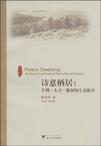诗意栖居
出版时间:2009-7 出版社:浙江大学出版社 作者:陈茂林 页数:208
Tag标签:无
前言
本书主要采用解构主义对中心和权威颠覆和消解的批评策略和新批评的细读技巧,挖掘、阐释美国作家亨利·大卫·梭罗的主要作品《在康科德与梅里马克河上的一周》、《瓦尔登湖》、《缅因森林》、《科德角》、《论公民的不服从》、《马萨诸塞州的奴隶制》、《没有原则的生活》、《为约翰·布朗请命》、《约翰·布朗的殉难》、《约翰·布朗的最后日子》、《马萨诸塞的自然史》、《冬季散步》、《心灵散步》、《梭罗日记》中体现的生态意蕴。本书还借助心理学批评、传记批评、福柯的权力与话语理论,系统、全面地分析、诠释梭罗生态思想的成因及内涵。 梭罗不仅是一位伟大的自然作家,同时也是一位关注社会和人类的精神生态建构的哲学家。他的自然生态、社会生态和精神生态思想,归纳概括起来,是一种充满生态智慧的生活方式——寺意生存,用德国存在主义哲学家海德格尔的话说,是“诗意栖居”的生活方式。海德格尔认为,“栖居”既是人类在大地上生存的方式,又是人类生存的真正目的和归宿。作为人的真正存在的“诗意栖居”包含三层内涵:“保护”、“自由”与“和谐”。本书认为,梭罗的自然生态、社会生态和精神生态思想,分别涉及人与自然的和谐、文明与自然的均衡发展、人的物质和精神生活的平衡,是一个有机的整体。它们既互相独立,又有着内在的联系:精神生态思想是关键,自然生态思想是根本。要实现人与自然、文明与自然的和谐发展,必须首先建设人的精神生态,恢复人的物质和精神生活的平衡状态,治疗人的“精神”疾病。只有这样,人的物质追求和精神生活才能保持和谐,社会、文明与自然才能和谐发展,才能消灭人类中心主义字宙观,最终消除生态危机。
内容概要
本书梳理、探讨了生态批评理论,把美国作家亨利·大卫·梭罗(1817—1862)放在生态批评的理论框架中,联系目前生态危机日益严重的现实语境,全面考察其生态思想的来源。系统而深入地透视、阐释其散文作品中体现的生态意蕴。丰富了梭罗思想研究,提供了生态批评实践的成功范例,为高校文学专业师生、文学研究者及爱好者提供生态批评理论与实践的重要参考。
作者简介
陈茂林,河南南阳人,南开大学英语语言文学博士,杭州师范大学外国语学院副教授,硕士生导师,研究方向为英美文学。近年来主要致力于生态批评理论与实践研究,发表系列研究论文多篇,主持或参与省部级、厅局级科研项目多项。
书籍目录
IntroductionChapter One A Survey of Ecocriticism 1.1 The Background of Ecocriticism 1.2 The Birth and Growth of Ecocriticism 1.3 The Definition of Ecocriticism 1.4 The Theoretical Connotation of Ecocriticism 1.4.1 The Theoretical Resources of Ecocriticism 1.4.2 Summary of the Theoretical Connotation of Ecocriticism 1.5 The Critical Strategy and Critical Methodology of Ecocriticism 1.6 The Significance of EcocriticismChapter Two The Origin of Thoreau's Ecological Ideas 2.1 Concord--The Living Environment of Thoreau's Childhood 2.2 The Tradition of Concord and American Culture 2.3 The Influence of American Transcendentalism 2.4 The Influence of American Indian Culture 2.5 The Influence of Oriental Culture Chapter Three Thoreau's Reflection on Natural Ecology 3.1 Highlighting the Existence of Nature: Depiction of Nature's Instrumental Value 3.1.1 The Aesthetic Value of Nature 3.1.2 The Recreational Value of Nature 3.2 Dismantling the Dichotomy between Man and Nature: Depiction of Nature's Inherent Value 3.2.1 The Multiplicity of Nature 3.2.2 The Subjectivity of Nature 3.3 Re-constructing the Relationship between Nature and Man:Harmony between Them 3.3.1 Nature as Mother of Humanity, and as an Interdependent and Interconnected Organic Whole 3.3.2 Man as Part of Nature 3.3.3 The Harmonious Interaction between Nature and HumanChapter Four Thoreau's Concern over Social Ecology 4.1 Critique of the Hierarchical Domination of Society 4.1.1 Critique of the Slavery System 4.1.2 Thoreau's Anti-War Stance 4.2 Attitude towards Science: Combination ofScience with Poetry 4.2.1 Critique of the Limitations of Science 4.2.2 Attributing Poetic Color to Scientific Method 4.3 Balanced Development between Nature and CivilizationChapter Five Thoreau's Meditation upon Spiritual Ecology 5.1 A Brief Discussion of the Terms of Spirit and Spiritual Ecology 5.2 Critique of People's Swelling Avarice for Material Things 5.3 Cultivation of Spiritual Ecology 5.3.1 Emphasis on Spiritual Aspiration 5.3.2 Advocacy of Harmony between People's Physical and Spiritual Life 5.4 The Interaction between Spiritual and Natural Ecology 5.4.1 Preserving Rather Than Devastating Nature 5.4.2 Revering and Appreciating Rather Than Ignoring NatureConclusion Works Cited Postscript
章节摘录
From the above, we see that Chinese culture, especially the doctrines of Confucius produced a deep impact on Thoreaus ecological ideas on nature, society, and human spirit. Besides, the Indian culture also influenced Thoreau. According to Robert Kuhn McGregor, Thoreau had been showing deep interest in Eastern books since the 1840s. He studied the Bhagvat Greeta during his stay at Walden Pond. In September 1849, he borrowed a two-volume French translation of one of the key works of Hindu religion, the Mahabharata, from the Harvard Library, along with a history of Hindu literature, and examined the Mahabharata——which collected a wide assortment of vedas, prayers, cautionary tales, laws, and other material. In the next year and a half, Thoreau borrowed the Vishnu Purana and the Sankya Karika, both works devoted largely to the proper living of ones life. The major influence of Hindu thought upon Thoreau lies in the following two aspects. First, the moral element of Hindu thought and the emphasis on spiritual attainment are interesting to him. And secondly, no less appealing to him was the Hindu vision of the creation of the world, which indicates that the universe, in both its spiritual and sensual aspects, emanates directly from God; and the physical world is in a state of constant flux; and that every thing produced in nature, whether animate or inanimate, is produced from the union of matter and spirit, and Gods in all things are the same (McGregor 96-99). Upon reading the Hindu literature, Thoreau developed a view of nature unique in the Western society of his time. He believed that spirit existed in all the natural entities on earth, and the spiritual and natural world were inseparable. Free from the utilitarian and mechanical view of nature, he insisted on the omnipresence of spirit, and looked upon nature as a complete and interrelated whole rather than a series of carefully delineated and discrete parts (McGregor 100). And according to Christy, such aspects of Indian culture influenced Thoreau a lot: the neglect of material necessities of civilization and life, the advocacy of multiplicity and eclecticism, the doctrine of the life after death, the view of death as a release of the vital force, a return to nature, the stress on the perfection and the mysterious union with God, the extreme love of solitude, the inner realization of GOd (22, 28, 214, 219, 221,222), etc.
媒体关注与评论
论文选题既有理论意义又有现实意义,对本研究领域文献资料有较全面的把握,提出了独到的见解,首次全面阐释了梭罗的自然生态、社会生态和精神生态三位一体的思想,对当今的生态保护具有重要启发作用。 清华大学教授、博士生导师 刘世生 该论文结合当今世界上生态危机日益严峻的局势,紧扣生态批评这一主题,将梭罗的生态思想运用到社会实践当中,强烈谴责了奴隶制之类社会制度、战争对地球生态圈毁灭性威胁、物欲膨胀的人生观导致精神世界的衰萎等弊病,从而达到颠覆、消解文明与自然的二元对立,使罗有关社会、文明与自然和谐发展的社会生态思想得到了进一步的发展。 中国人民大学教授、博士生导师 孙宏 作者在主要大量阅读第一手外文资料的基础上,运用处于当前国际学界前沿的当代西方生态批评理论,对梭罗作品中所体现出来的关于自然生态、社会生态和精神生态思想作了比较系统、全面并且翔实的论述,这对于丰富和加深国内美国文学研究界对梭罗的理解和认识很有意义和价值。 上海外国语大学教授、博士生导师 谢天振
图书封面
图书标签Tags
无
评论、评分、阅读与下载
用户评论 (总计6条)
- 锻炼英语
- 给人哲思的空间
- 这本书装订精细,图文并茂。很有实用价值。邮购服务快捷,周到
- 午后的阅读倍感快乐
- 书很好,而且很便宜
- 英文的,还没有读完,觉得还行吧.
